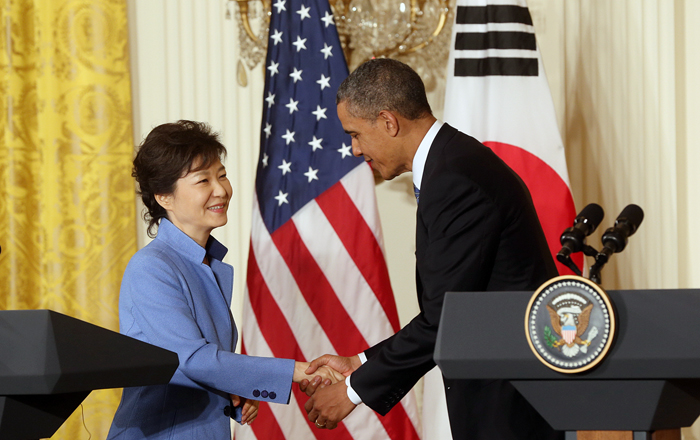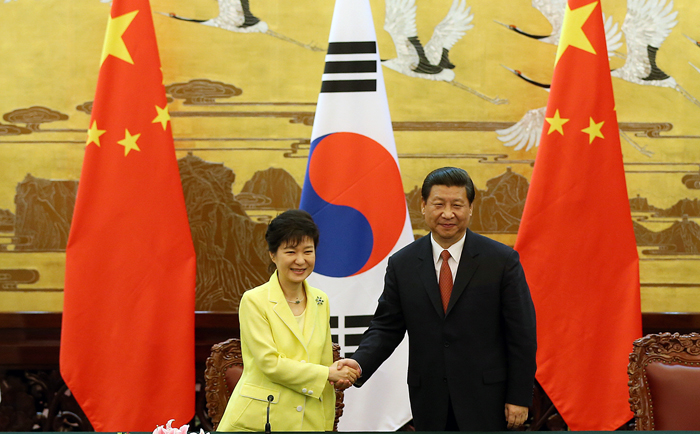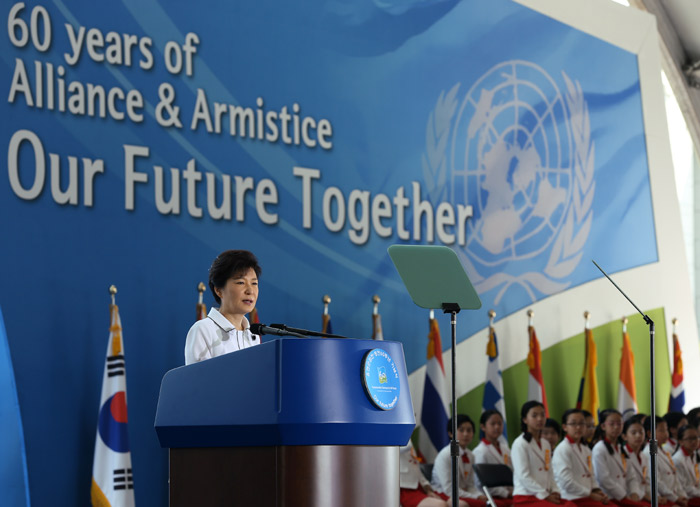-
 Korea.net's 24-hour YouTube channel
Korea.net's 24-hour YouTube channel- NEWS FOCUS
- ABOUT KOREA
- EVENTS
- RESOURCES
- GOVERNMENT
- ABOUT US
Foreign media outlets have positively assessed the leadership of President Park Geun-hye and have praised her overall management of national affairs, as her administration marks the first anniversary of her inauguration on February 25.
The Wall Street Journal highly valued her North Korean policy specifically and her foreign policy in general. In the article, "Park's one-year scorecard: Could do better," published on February 24, the daily mentioned her high overall approval ratings, as shown in polls conducted by Korea’s leading dailies: the JoongAng Ilbo, the DongA Ilbo and the Seoul Economic Daily. The good ratings are attributed to, the article said, “her tough, but flexible, policy on North Korea.”
In the article, the reporter said that President Park earns praise for not giving in to North Korea's brinkmanship. The article said that 80 percent of the respondents of the JoongAng survey, and 75 percent of DongA Ilbo respondents, backed President Park’s policy approach, which has led to a, “resumption of cross-border family reunions and work at the jointly-run industrial site without major South Korean concessions.”
In regard to foreign policy, the Wall Street Journal writer said that 69% of respondents to the DongA Ilbo and 71% to the JoongAng supported her diplomacy and national security policy and backed President Park’s efforts to strengthen relationships with both the U.S. and China. The reporter wrote that President Park received support for her economic and job-creation policy from 50 percent of JoongAng respondents and 65 percent of DongA Ilbo respondents.
The Wall Street Journal article said that 52 percent of respondents to the DongA Ilbo poll and 59 percent of respondents to the JoongAng Ilbo highly valued President Park’s handling of domestic politics.
Leading Japanese newspapers also recognized President Park’s North Korean policy and diplomatic ability by publishing special reports on February 25 to mark her first year in office. The Asahi Shimbun reported that President Park’s North Korean policy, and her administration’s diplomacy in particular, won high approval ratings. The Mainichi Shimbun said that President Park has been maintaining an approval rating of 60 percent or higher in various surveys and polls thanks to her North Korean policy and diplomatic ability. Based on such high support, it said that the president will focus more on employment and social welfare policies in the future. The Nihon Keizai Shimbun wrote that President Park’s diplomatic stance, in which she emphasizes principles and avoids compromise, led Pyongyang to show flexibility.


Meanwhile, Cheong Wa Dae said on February 21 that right after her inauguration last year, the Korean Peninsula was like the calm before the storm. However, the president’s office said that one of the most important outcomes of President Park’s first year in office is the Korean Peninsula trust-building process, which led to the resumption of inter-Korean dialogue within the first six months and which has now allowed for family reunions within the first year in office.

Cheong Wa Dae analyzed about 10,000 news articles published by 280 foreign media outlets from 31 countries throughout the year. According to its analysis, the U.K.-based Financial Times wrote on November 5 last year that, “Ms. Park’s unflustered response to North Korean talk of war in March and April helped to restore public confidence in her leadership.“ The New York Times also wrote on February 6 this year that, “The deal [to hold the family reunions] was widely seen as a sign that relations between the two countries may be warming after threats of war followed the North’s nuclear test early last year.”
Cheong Wa Dae said that President Park’s leadership has been highly valued by the international community and has won worldwide recognition: the Washington Post included her in its list of top ten world leaders; Forbes included her in its list of the 72 most powerful people in the world in 2013; and, Time magazine included her in its list of 100 most influential people in the world.
By Yoon Sojung
Korea.net Staff Writer
arete@korea.kr
The Wall Street Journal highly valued her North Korean policy specifically and her foreign policy in general. In the article, "Park's one-year scorecard: Could do better," published on February 24, the daily mentioned her high overall approval ratings, as shown in polls conducted by Korea’s leading dailies: the JoongAng Ilbo, the DongA Ilbo and the Seoul Economic Daily. The good ratings are attributed to, the article said, “her tough, but flexible, policy on North Korea.”
In the article, the reporter said that President Park earns praise for not giving in to North Korea's brinkmanship. The article said that 80 percent of the respondents of the JoongAng survey, and 75 percent of DongA Ilbo respondents, backed President Park’s policy approach, which has led to a, “resumption of cross-border family reunions and work at the jointly-run industrial site without major South Korean concessions.”
In regard to foreign policy, the Wall Street Journal writer said that 69% of respondents to the DongA Ilbo and 71% to the JoongAng supported her diplomacy and national security policy and backed President Park’s efforts to strengthen relationships with both the U.S. and China. The reporter wrote that President Park received support for her economic and job-creation policy from 50 percent of JoongAng respondents and 65 percent of DongA Ilbo respondents.
The Wall Street Journal article said that 52 percent of respondents to the DongA Ilbo poll and 59 percent of respondents to the JoongAng Ilbo highly valued President Park’s handling of domestic politics.
Leading Japanese newspapers also recognized President Park’s North Korean policy and diplomatic ability by publishing special reports on February 25 to mark her first year in office. The Asahi Shimbun reported that President Park’s North Korean policy, and her administration’s diplomacy in particular, won high approval ratings. The Mainichi Shimbun said that President Park has been maintaining an approval rating of 60 percent or higher in various surveys and polls thanks to her North Korean policy and diplomatic ability. Based on such high support, it said that the president will focus more on employment and social welfare policies in the future. The Nihon Keizai Shimbun wrote that President Park’s diplomatic stance, in which she emphasizes principles and avoids compromise, led Pyongyang to show flexibility.

President Park Geun-hye (left) and U.S. President Barack Obama shake hands at a joint press conference after holding summit talks at the White House on May 7, 2013. (photo: Cheong Wa Dae)

President Park Geun-hye (left) and Chinese President Xi Jinping shake hands after the signing ceremony of MOUs to boost bilateral cooperation, in the Great Hall of the People in central Beijing on June 27, 2013. (photo: Cheong Wa Dae)
Meanwhile, Cheong Wa Dae said on February 21 that right after her inauguration last year, the Korean Peninsula was like the calm before the storm. However, the president’s office said that one of the most important outcomes of President Park’s first year in office is the Korean Peninsula trust-building process, which led to the resumption of inter-Korean dialogue within the first six months and which has now allowed for family reunions within the first year in office.

President Park Geun-hye delivers a speech at a ceremony held at the War Memorial in Korea, in Yongsan-gu (Yongsan District), Seoul, on July 27, 2013, to mark the 60th anniversary of the Korean Armistice Agreement ending the Korean War. (photo: Jeon Han)
Cheong Wa Dae analyzed about 10,000 news articles published by 280 foreign media outlets from 31 countries throughout the year. According to its analysis, the U.K.-based Financial Times wrote on November 5 last year that, “Ms. Park’s unflustered response to North Korean talk of war in March and April helped to restore public confidence in her leadership.“ The New York Times also wrote on February 6 this year that, “The deal [to hold the family reunions] was widely seen as a sign that relations between the two countries may be warming after threats of war followed the North’s nuclear test early last year.”
Cheong Wa Dae said that President Park’s leadership has been highly valued by the international community and has won worldwide recognition: the Washington Post included her in its list of top ten world leaders; Forbes included her in its list of the 72 most powerful people in the world in 2013; and, Time magazine included her in its list of 100 most influential people in the world.
By Yoon Sojung
Korea.net Staff Writer
arete@korea.kr













